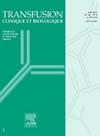Impact of oral iron supplementation on first-time whole blood donors deferred due to low haemoglobin
IF 1.2
4区 医学
Q4 HEMATOLOGY
引用次数: 0
Abstract
Background and objectives
Low haemoglobin (Hb) in whole blood donors account for 15.5% to 55.8% deferrals which is easily treatable. The present study was planned to determine the number of blood donors deferred due to low Hb becoming eligible to donate whole blood after iron supplementation.
Material and methods
The prospective interventional study was conducted over 18 months. Blood donors presenting for whole blood donation but deferred for low Hb (<125 g/L) were included. First-time whole blood donors showing a picture of iron deficiency based on complete blood counts (CBC) and peripheral blood film (PBF) on the sample collected before the initiation of oral iron supplementation (Day 0) were contacted and requested to visit the blood centre. They were counselled and provided ferrous sulphate tablets (325 mg containing 100 mg elemental iron) to be taken daily after meals for 60 days. Compliance with the intake of iron supplementation was ensured. After completing oral iron supplementation for 60 days, a repeat sample was collected.
Results
A total of 126 donors were provided with iron supplementation for 60 days. A significant increase in mean haemoglobin was observed in the blood donors who completed iron supplementation therapy for 60 days [109 (15) to 126 (15) g/L; p value < 0.001]. Seventy-six (60%) donors became eligible to donate blood. Regression models indicated that Hb levels on Day 60 were independently predicted by gender in donors who became eligible to donate.
Conclusion
Iron supplementation has the potential to enhance donor eligibility and significantly expand the safe donor pool.
口服铁质补充剂对因血红蛋白低而延期的首次全血献血者的影响。
背景和目的:全血献血者血红蛋白(Hb)偏低导致 15.5% 至 55.8% 的献血者推迟献血,而这种情况很容易治疗。本研究计划确定因血红蛋白过低而推迟献血的献血者在补充铁剂后符合献全血条件的人数:前瞻性干预研究为期 18 个月。研究对象包括因低血红蛋白(< 125g/L)而推迟全血捐献的献血者。根据全血细胞计数(CBC)和外周血片(PBF),首次全血献血者在开始口服铁补充剂前(第 0 天)采集的样本显示有缺铁症状。他们接受了咨询,并获得了硫酸亚铁片(325 毫克,含 100 毫克元素铁),每天饭后服用,连续服用 60 天。确保他们遵守铁质补充剂的摄入量。在完成 60 天的口服铁质补充后,再次采集样本:结果:共有 126 名捐献者接受了为期 60 天的铁质补充。结果:共有 126 名献血者接受了为期 60 天的铁质补充治疗,完成 60 天铁质补充治疗的献血者平均血红蛋白明显增加[109(15)克/升至 126(15)克/升;P 值]:铁补充剂有可能提高献血者的资格,并显著扩大安全献血者库。
本文章由计算机程序翻译,如有差异,请以英文原文为准。
求助全文
约1分钟内获得全文
求助全文
来源期刊
CiteScore
2.50
自引率
11.80%
发文量
234
审稿时长
36 days
期刊介绍:
Transfusion Clinique et Biologique, the official journal of the French Society of Blood Transfusion (SFTS):
- an aid to training, at a European level
- the only French journal indexed in the hematology and immunology sections of Current Contents
Transfusion Clinique et Biologique spans fundamental research and everyday practice, with articles coming from both sides. Articles, reviews, case reports, letters to the editor and editorials are published in 4 editions a year, in French or in English, covering all scientific and medical aspects of transfusion: immunology, hematology, infectious diseases, genetics, molecular biology, etc. And finally, a convivial cross-disciplinary section on training and information offers practical updates.
Readership:
"Transfusers" are many and various: anesthetists, biologists, hematologists, and blood-bank, ICU and mobile emergency specialists...

 求助内容:
求助内容: 应助结果提醒方式:
应助结果提醒方式:


